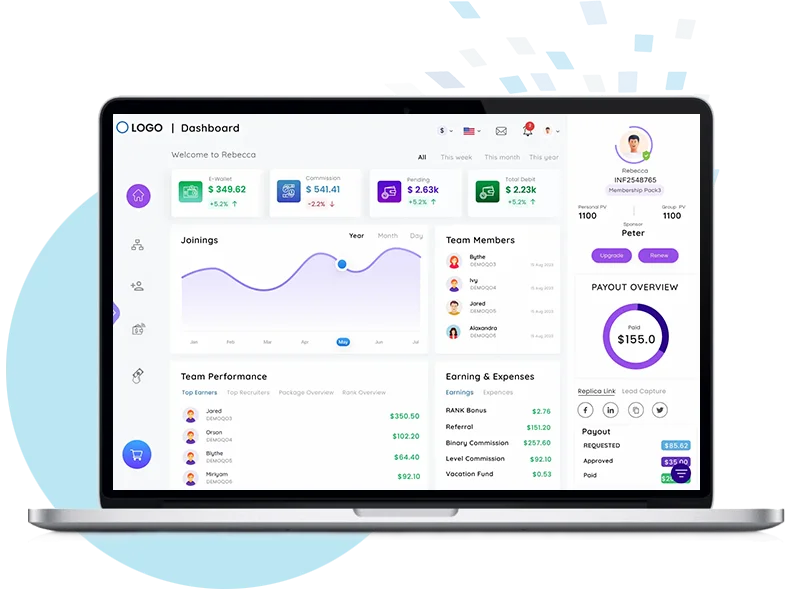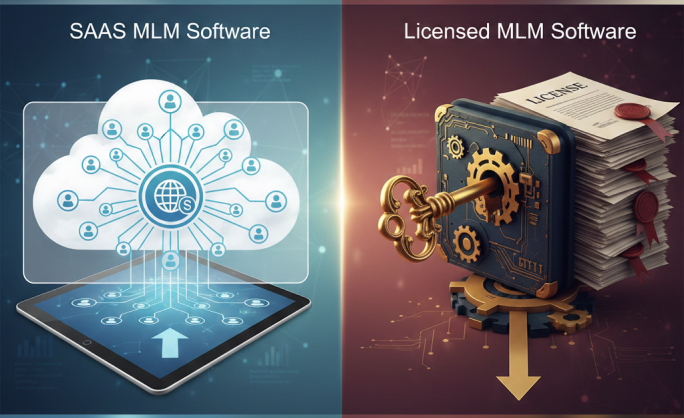The United States, renowned for its higher financial landscape, thrives on various ventures with significant earning potential, among which Multi Level Marketing has emerged as a prominent contender. With millions actively participating, MLM has become a cornerstone of the American entrepreneurial scene in the past years.
Nevertheless, amidst its widespread adoption, a fundamental question arises: – Is MLM Legal in the USA? And in this blog we have answered this very question which will clear all your doubts regarding the legality of MLM in the USA.
The Legality of MLM in the USA
The good news? MLMs are legal in the USA. This is according to the Federal Trade Commission (FTC), the government agency that regulates business practices to protect consumers.
However, there’s a condition: MLMs can easily tip over into illegal pyramid schemes if their focus becomes recruitment over product sales. The FTC has clearly stated this distinction between an MLM and the pyramid scheme.
The Federal Trade Commission (FTC) acts as a guardian for consumers regarding Multi Level Marketing businesses in the USA. Here’s a breakdown of their role:
Role of the Federal Trade Commission (FTC)
Legality, Not Legitimacy: The FTC ensures MLMs operate within the law, primarily by preventing them from morphing into pyramid schemes that focus on recruitment over selling products.
Fair Practices: They enforce regulations to prevent deceptive advertising, unrealistic income claims, and unfair pressures on participants to buy excessive inventory.
Consumer Education: The FTC offers resources to help people identify potential MLM red flags and make informed decisions before joining an MLM opportunity.
While the FTC doesn’t endorse specific MLMs, they work to ensure a fair and legal playing field for both MLM companies and potential participants.
MLM vs. Pyramid Scheme: Understanding the Difference
What is Multi-Level Marketing (MLM)?
Multi-Level Marketing (MLM) is a business model where companies sell products or services through a network of independent distributors. Distributors earn commissions not only from their own sales but also from the sales made by the individuals they recruit, creating a hierarchical structure. These recruited individuals are referred to as a “downline.” MLM often incentivizes distributors with bonuses and rewards for both sales and recruitment efforts.
What is a Pyramid Scheme?
A pyramid scheme is an illegal and fraudulent business model that focuses primarily on recruiting participants rather than selling legitimate products or services. Participants pay an initial fee, often disguised as a membership or starter kit, and make money by enrolling new members. These new recruits, in turn, must recruit more individuals to generate revenue. The income for those at the top of the pyramid comes mainly from recruitment fees, not from actual product sales.
Key Differences Between MLM and Pyramid Schemes
Product/Service Sales:
MLM:MLMs are based on the sale of legitimate products or services. While the focus may also be on recruitment, there is an actual product being sold to consumers.
Pyramid Scheme: Pyramid schemes do not involve the sale of legitimate products or services. Instead, the focus is on recruiting new participants who pay fees to join, and the primary source of income is from these recruitment fees.
Revenue Source:
MLM:In MLM, income is generated from both product sales and commissions from recruits’ sales, though recruitment is often emphasized.
Pyramid Scheme: In pyramid schemes, income is generated mainly from the fees that new recruits pay to join, rather than from the sale of any real product or service.
Legality:
MLM:MLMs are legal in many countries, but they must follow strict guidelines regarding product sales and avoid focusing solely on recruitment. If the primary emphasis is on selling a product and not on recruiting, it can be a legitimate business model.
Pyramid Scheme: Pyramid schemes are illegal in most countries because they are deceptive and unsustainable. They rely on an endless cycle of recruitment and eventually collapse when there are no new recruits to sustain the scheme.
Sustainability:
MLM: MLMs can be sustainable if the product has genuine demand, and if the focus is on sales and customer acquisition. However, they still often have high failure rates due to the difficulty of making significant profits.
Pyramid Scheme: Pyramid schemes are inherently unsustainable because they rely on continuous recruitment to generate income. Once the pool of new recruits shrinks, the scheme collapses, leaving those at the bottom with losses.
Earning Potential:
MLM: While MLM offers the potential for unlimited income based on sales and recruitment, most distributors earn very little, and only a few at the top of the hierarchy make significant money.
Pyramid Scheme: In pyramid schemes, the vast majority of participants lose money, and only those at the very top benefit. Since the scheme relies on recruitment, only a few individuals at the top make profits, while the rest suffer losses.
Legal and Ethical Issues:
MLM: MLMs can be controversial, with some companies operating in ways that resemble pyramid schemes, leading to legal scrutiny. However, they can operate ethically if they emphasize product sales over recruitment.
Pyramid Scheme: Pyramid schemes are inherently deceptive and fraudulent, making them illegal in most jurisdictions. Participants are often misled into thinking they will profit from a legitimate business opportunity.
While both MLM and pyramid schemes involve recruitment, the main difference lies in the presence of a legitimate product or service in MLMs. MLM is legal and can be ethical if structured properly, with a focus on genuine sales. Pyramid schemes, on the other hand, are fraudulent and unsustainable, relying entirely on recruitment fees and ultimately leading to financial losses for most participants.
Here’s a simplified version to understand better;
| Aspect | Multi Level Marketing | Pyramid Scheme |
|---|---|---|
| Purpose | Legitimate sales of products or services | Recruiting members with promise of high returns |
| Compensation | Earn commissions from product sales and recruits’ sales | Primarily based on recruitment fees |
| Legality | Legal if products or services are genuine and sales focused | Often illegal due to focus on recruitment |
| Risk | Lower risk | High risk of collapse or potential legal issues |
| Sustainability | Sustainable if focused on product sales and genuine recruitment | Unsustainable, collapses when recruitment stops |
 Did You
Know?
Did You
Know?
For an MLM to be compliant (i.e., legal and not a pyramid scheme), it must adhere to the 70% rule that “at least 70% of all goods sold must be purchased by non-distributors.” – Forbes
Red Flags to Identify Potential Pyramid Schemes Disguised as MLMs
Emphasis on Recruitment Over Product Sales
One of the clear signs of an illegal pyramid scheme disguising as an MLM is an unequal focus on recruiting new members rather than selling actual products or services. If the primary source of income for participants comes from recruitment commissions rather than retail sales, be careful.
High Initial Investment Requirements
Be wary of MLMs that pressure you to make substantial upfront investments in inventory, starter kits, or training materials with promises of lucrative returns. Legitimate MLMs typically have low startup costs and emphasize earnings through product sales rather than recruitment or inventory purchases.
Complex Compensation Structures
Beware of MLMs with complex compensation plans that are difficult to understand or heavily incentivize recruiting new members rather than selling products. Legitimate MLMs usually have transparent compensation structures that reward both retail sales and team-building efforts without excessive emphasis on recruitment.
Promises of Unrealistic Earnings
If an MLM company makes extravagant claims about the potential earnings without providing realistic income disclosures or if they use misleading testimonials to lure in new recruits, exercise caution. Legitimate MLMs emphasize the importance of hard work, dedication, and realistic expectations rather than making unrealistic promises of overnight success.
Lack of Retail Sales
Legitimate MLMs derive a significant portion of their revenue from retail sales to end consumers. If a company lacks a robust retail sales component and relies heavily on internal consumption or purchases by distributors themselves (inventory loading), it could be indicative of an illegal scheme where recruitment is prioritized over genuine product sales.
Lack of Transparency and Accountability
Legitimate MLMs are transparent about their business practices, including product pricing, compensation plans, and company policies. If a company is evasive or unwilling to provide clear answers to your questions, it may be a red flag indicating potential illegitimacy.
Legal Troubles and Regulatory Scrutiny
Research the company’s history and track record, including any past legal troubles or regulatory sanctions. If the company has faced lawsuits, regulatory actions, or allegations of operating as a pyramid scheme in the past, proceed with caution and consider it a warning sign.
Finding a Legit MLM Company: Do Your Research!
There’s no guaranteed formula for finding a legitimate MLM company, but profound research is the key. Here are some tips:
 Product
Quality
Product
Quality
Does the company offer high-quality, in-demand products? Research customer reviews and independent analyses.
 Company
History
Company
History
Research the company’s track record and reputation. How long have they been in business? Are there any complaints filed against them with the FTC?
 Support
System
Support
System
Does the company offer adequate training and support to help you succeed?
 Focus on
Retail Sales
Focus on
Retail Sales
Look for companies that emphasize selling products to end consumers, not just focusing on recruiting.
 Starter
Kit
Costs
Starter
Kit
Costs
Beware of MLMs that pressure you to buy large quantities of products upfront. Starter kits should be reasonable and not a financial burden.
How to Spot Legitimate MLM Companies: Essential Tips for Success
Navigating the MLM landscape requires careful consideration and due diligence to ensure that you’re investing your time, effort, and money wisely. To help you make informed decisions, here are some essential tips for identifying legitimate MLM companies:
 Research the
Company
Research the
Company
Before joining any MLM venture, conduct thorough research on the company. Look for information about its history, reputation, products or services offered, and compensation plan. Legitimate MLMs are transparent about their operations and provide comprehensive details to potential recruits.
 Evaluate the
Products
Evaluate the
Products
A reputable MLM company will offer high-quality products or services that have genuine value to consumers. Take the time to evaluate the products or services being promoted. Ensure they are unique, meet a genuine need, and are competitively priced. Avoid MLMs that primarily focus on recruiting without offering products, as they may resemble pyramid schemes.
 Assess the
Compensation Plan
Assess the
Compensation Plan
Understand the compensation plan offered by the MLM company. Legitimate MLMs provide fair and transparent compensation structures that reward both sales and recruitment efforts. Beware of schemes that emphasize recruitment over product sales, as this can indicate a pyramid scheme disguised as an MLM.
 Check for Red
Flags
Check for Red
Flags
Pay attention to warning signs that may indicate an MLM is dubious. These include excessive emphasis on recruitment, promises of quick and easy riches, high upfront costs or mandatory purchases, lack of product focus, and resistance to providing detailed information. Trust your instincts and proceed with caution if something feels off.
 Seek Reviews and
Testimonials
Seek Reviews and
Testimonials
Look for unbiased reviews and testimonials from current and former distributors of the MLM company. Hearing from individuals who have firsthand experience can provide valuable insights into the company’s culture, support system, and overall viability. Beware of overly positive reviews that seem too good to be true.
 Consult with
Professionals
Consult with
Professionals
Consider seeking advice from legal and financial professionals before committing to an MLM opportunity. They can help you understand the legal implications, financial risks, and potential pitfalls associated with MLM ventures, allowing you to make informed decisions.
 Trust Your
Instincts
Trust Your
Instincts
Ultimately, trust your instincts when evaluating MLM opportunities. If something seems to raise doubts, it’s important to listen to your gut feeling. Don’t allow yourself to be pressured or rushed into joining an MLM company without thoroughly investigating it first.
While legitimate MLM opportunities do exist, it’s essential to approach them with caution and skepticism. By following these tips and conducting thorough due diligence, you can increase your chances of finding reputable MLM companies that align with your goals and values.
A Case Study of MLM Companies in the USA
While MLM is legal in the USA, the line between legitimate businesses and pyramid schemes can be blurry. Let’s take a closer look at four established MLM companies to understand their strengths, weaknesses, and key factors for success.

Amway
Founded: 1959
Founders: Rich DeVos and Jay Van Andel
Products: Amway offers a wide range of health and wellness products, including vitamins, dietary supplements, beauty care products, and home care items.
Strengths: Amway boasts a long history, global presence, and brand recognition. They offer extensive training and support for distributors.
Weaknesses: Critics point to the high cost of entry (starter kits) and the difficulty of achieving significant income solely through retail sales.
Key Factors for Success: Strong sales and marketing skills, a large and active network, and significant investment of time and effort are crucial for success with Amway.

Herbalife
Founded: 1980
Founder: Mark Hughes
Strengths: Herbalife has a strong brand identity and loyal customer base. They invest heavily in marketing and sponsor high-profile athletes.
Products: Herbalife offers nutrition and weight-loss products, including shakes, meal replacements, and dietary supplements.
Weaknesses: The company has faced controversy regarding the effectiveness of its products and the income potential for distributors.
Key Factors for Success: Building a large team and promoting product sales through social media and personal connections are key to success with Herbalife.

Avon
Founded: 1886
Founder: David H. McConnell
Strengths: Avon has a long-standing reputation and brand recognition, particularly among women. They offer a flexible work model and a large product selection.
Products: Avon is a household name in beauty and personal care products, offering makeup, skincare, fragrances, and bath & body items.
Weaknesses: The market for beauty products is highly competitive, and saturation can make retail sales challenging.
Key Factors for Success: Building a network of loyal customers and utilizing Avon’s social selling tools are important for success.

Forever Living Products
Founded: 1978
Founder: Rex Maughan
Strengths: The company offers a unique product line with a focus on natural ingredients. They have a strong presence in international markets.
Products: Forever Living Products specializes in aloe-based health and wellness products, including drinks, supplements, and skincare items.
Weaknesses: The MLM model can be challenging, and saturation in the health and wellness market is a concern.
Key Factors for Success: Strong salesmanship, a focus on customer education about aloe vera’s benefits, and active participation in company events are important for success.
While all four companies are legal MLMs in the USA, careful research is crucial before joining any MLM opportunity. Understanding the strengths, weaknesses, and key factors for success can help you make informed decisions.
Consumer Protection and Resources that help Customers
Scams and fraudulent schemes are whirling around the corner and consumers must stay vigilant in protecting their rights and interests. This is particularly true in multi level marketing. If you find yourself caught in an MLM fraud, knowing your rights and accessing the right resources can make all the difference. Here are steps to take when facing MLM fraud and resources that can assist you:
Recognize the Signs:
The first step in dealing with MLM fraud is to recognize it. Understand the common red flags and if something feels off, trust your instincts and investigate further.
Document Everything:
Keep detailed records of your interactions with the MLM company. Documentation will be essential if you need to file a complaint or seek legal advice later on.
Cease Further Engagement:
If you suspect MLM fraud, stop all further engagement with the company immediately. Cutting ties early can help minimize losses and prevent further harm.
Contact Consumer Protection Agencies:
Reach out to consumer protection agencies or regulatory bodies. Provide them with evidence of the fraudulent activity and seek their guidance on next steps.
File a Complaint:
You can file a formal complaint against the MLM company. IN USA, this can be done through the Federal Trade Commission (FTC).
Seek Legal Advice:
Consulting a lawyer who specializes in consumer protection or MLM regulations. They can provide legal guidance on your rights, options, and potential remedies available to you.
Reach Out to Support Groups:
Connect with support groups or online communities. These groups can offer valuable support, advice, and also share resources and strategies for dealing with MLM fraud.
Educate Others:
Use your experience to educate others about the dangers of MLM fraud and how to avoid falling victim to similar schemes. This can help prevent others from experiencing the same.
Helpful Resources for Consumers: Understanding Your Protections
Being an informed consumer is your best defense in the marketplace. Luckily, there are a whole host of resources available to help you navigate your purchasing decisions and protect your rights. Today, we’ll be focusing on two key organizations: The Federal Trade Commission (FTC) and the Michigan Consumer Protection (MCP).
Federal Trade Commission (FTC)
The FTC is the primary agency of the US government tasked with protecting consumers.
Enforcing laws
The FTC enforces laws that prevent unfair or deceptive business practices. This includes protecting consumers from pyramid schemes, which can sometimes be confused with legitimate MLM businesses.
Providing consumer information
The FTC website offers a wealth of information on various consumer topics, including avoiding scams, understanding contracts, and protecting your identity. This can be a valuable resource for both consumers and MLM businesses that want to ensure they are following best practices.
Taking action against fraud
The FTC investigates and prosecutes fraudulent business practices. This helps to maintain a fair marketplace for legitimate businesses, including ethical MLM companies.
Michigan Consumer Protection (MCP)
The Michigan Consumer Protection (MCP) is a state-level agency that works in conjunction with the FTC to enforce consumer protection laws within Michigan. They offer similar resources to the FTC, but with a specific focus on Michigan residents and businesses.
Understanding Compliance
MLM businesses are required to comply with FTC regulations and state-specific laws like those enforced by the MCP. Familiarizing yourself with these resources ensures your business operates legally and ethically.
Avoiding Pyramid Scheme Accusations
The FTC and MCP actively crack down on pyramid schemes disguised as MLM businesses. Understanding the legal distinctions between these models can help your MLM business avoid suspicion and legal trouble.
Building Consumer Trust
By demonstrating a commitment to consumer protection, MLM businesses can build trust and credibility with potential customers. Highlighting your adherence to FTC and MCP guidelines shows transparency and fosters a positive brand image.
Conclusion
Hope you ‘ve found the answer to the long run question – Is MLM Legal in USA? The legality of MLMs in the USA hinges on adherence to regulatory guidelines and ethical business practices. While MLMs present viable opportunities for entrepreneurship and income generation, navigating this landscape requires vigilance, and thorough research. By understanding the nuances between legal MLMs and pyramid schemes, individuals can embark on their MLM journey with confidence and clarity.










